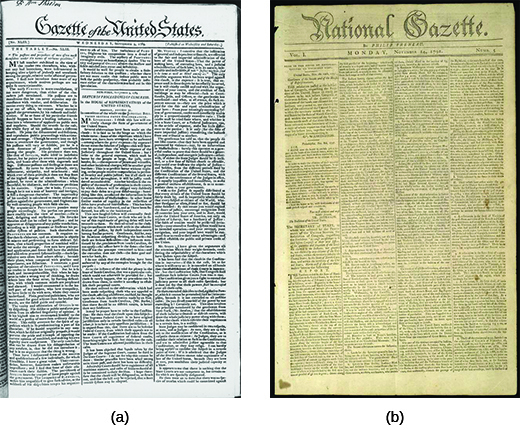| << Chapter < Page | Chapter >> Page > |
With the support of Washington, the entire Hamiltonian economic program received the necessary support in Congress to be implemented. In the long run, Hamilton’s financial program helped to rescue the United States from its state of near-bankruptcy in the late 1780s. His initiatives marked the beginning of an American capitalism, making the republic creditworthy, promoting commerce, and setting for the nation a solid financial foundation. His policies also facilitated the growth of the stock market, as U.S. citizens bought and sold the federal government’s interest-bearing certificates.
James Madison and Thomas Jefferson felt the federal government had overstepped its authority by adopting the treasury secretary’s plan. Madison found Hamilton’s scheme immoral and offensive. He argued that it turned the reins of government over to the class of speculators who profited at the expense of hardworking citizens.
Jefferson, who had returned to the United States in 1790 after serving as a diplomat in France, tried unsuccessfully to convince Washington to block the creation of a national bank. He also took issue with what he perceived as favoritism given to commercial classes in the principal American cities. He thought urban life widened the gap between the wealthy few and an underclass of landless poor workers who, because of their oppressed condition, could never be good republican property owners. Rural areas, in contrast, offered far more opportunities for property ownership and virtue. In 1783 Jefferson wrote, “Those who labor in the earth are the chosen people of God, if ever he had a chosen people.” Jefferson believed that self-sufficient, property-owning republican citizens or yeoman farmers held the key to the success and longevity of the American republic. (As a creature of his times, he did not envision a similar role for either women or nonwhite men.) To him, Hamilton’s program seemed to encourage economic inequalities and work against the ordinary American yeoman.
Opposition to Hamilton, who had significant power in the new federal government, including the ear of President Washington, began in earnest in the early 1790s. Jefferson turned to his friend Philip Freneau to help organize the effort through the publication of the National Gazette as a counter to the Federalist press, especially the Gazette of the United States ( [link] ). From 1791 until 1793, when it ceased publication, Freneau’s partisan paper attacked Hamilton’s program and Washington’s administration. “Rules for Changing a Republic into a Monarchy,” written by Freneau, is an example of the type of attack aimed at the national government, and especially at the elitism of the Federalist Party. Newspapers in the 1790s became enormously important in American culture as partisans like Freneau attempted to sway public opinion. These newspapers did not aim to be objective; instead, they served to broadcast the views of a particular party.


Notification Switch
Would you like to follow the 'U.s. history' conversation and receive update notifications?